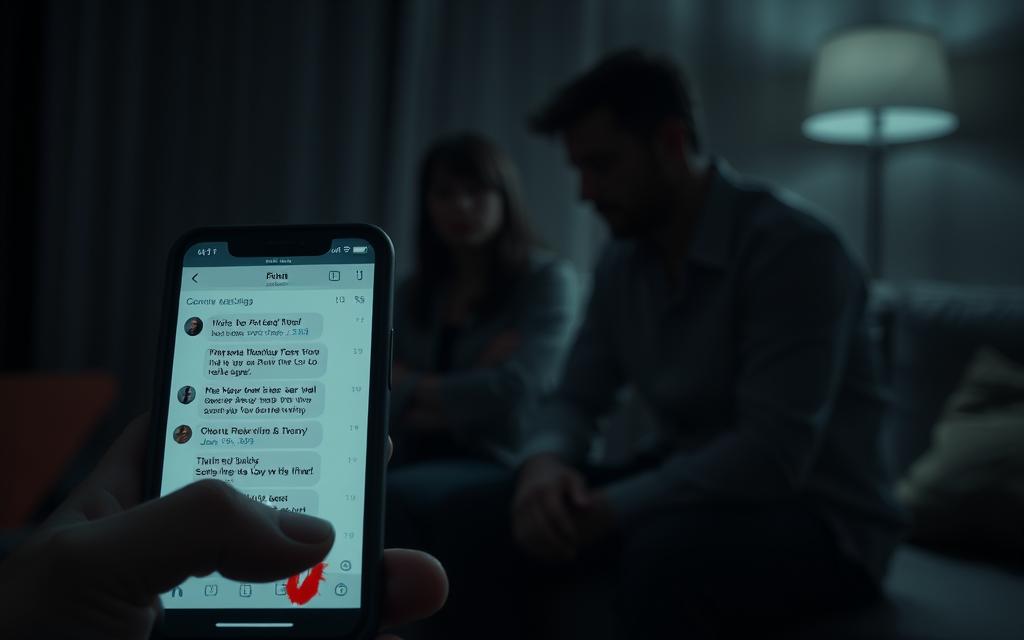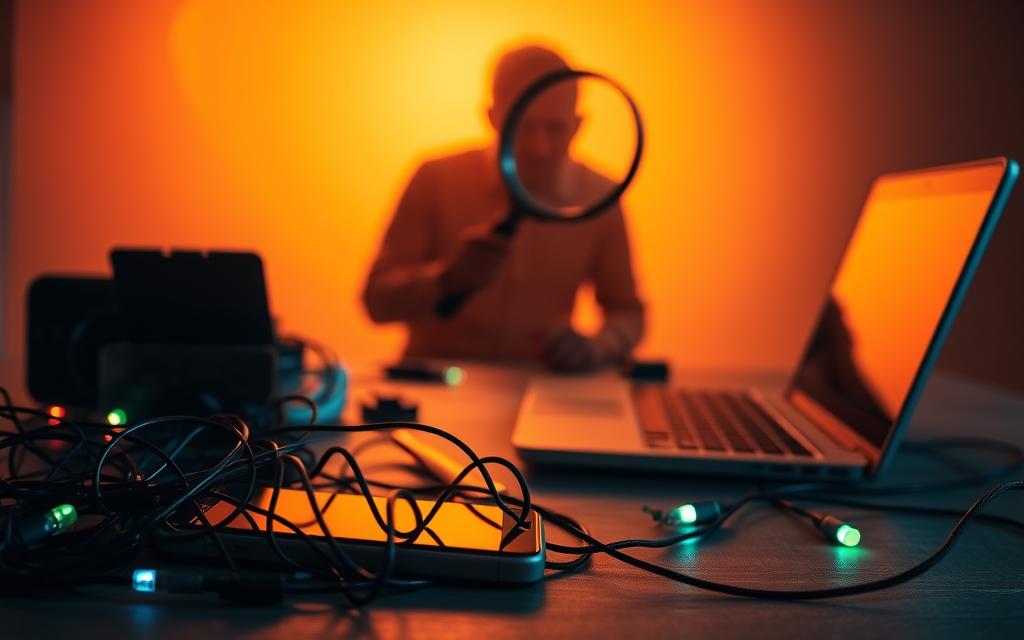Navigating relationship doubts can feel overwhelming. Trust is the foundation of any partnership, but sometimes behaviors emerge that make us question its strength. Let’s explore how subtle shifts in communication or habits might signal deeper issues.
Cheating, as defined by relationship experts, involves emotional or physical secrecy that breaks mutual agreements. It’s not always dramatic—sometimes it’s unexplained emotional distance or sudden changes in routine. These patterns often start small but grow into clear warnings if left unaddressed.
This article focuses on recognizing those red flags before they escalate. You’ll learn to spot inconsistencies in behavior while maintaining compassion for both yourself and your partner. Relationships thrive on openness, and understanding these signals helps foster honest conversations.
Ready to dive deeper? The next sections break down specific patterns and offer practical advice for addressing concerns. Knowledge is power—especially when it comes to protecting your emotional well-being.
Introduction
Modern relationships require awareness and clarity. This guide helps identify patterns that might suggest emotional disconnect or hidden behaviors. Whether you’re noticing odd habits or simply want to strengthen your bond, recognizing these cues can transform how you approach intimacy.
Why This Matters Now
Infidelity isn’t always physical. Many couples define it as secret emotional investments—like late-night messaging with coworkers or hiding friendship boundaries. A 2023 study found 41% of adults consider emotional secrecy as damaging as physical cheating.
Who Needs This Insight?
This article benefits anyone who:
- Notices sudden changes in their partner’s schedule
- Feels conversations have become guarded
- Wonders about common red flags in relationships
Timing plays a crucial role. Small shifts in behavior—like unexplained phone anxiety or new hobbies that exclude you—often accumulate over weeks. By addressing these early, you create space for honest dialogue rather than suspicion.
Our approach avoids blame. Instead, we focus on fostering mutual understanding. Relationships thrive when both parties feel heard, and sometimes recognizing patterns is the first step toward rebuilding trust.
Understanding Infidelity and Cheating
Relationships thrive on shared expectations, but what happens when those boundaries blur? Cheating means different things to different people, making it crucial to discuss definitions openly.

Defining Cheating in Modern Relationships
Infidelity isn’t just physical—it’s any secret behavior that violates agreed-upon relationship rules. For some, it’s hidden emotional connections. For others, it’s late-night texting with an ex. Common examples include:
- Emotional affairs: Sharing intimate thoughts with someone outside the relationship
- Physical intimacy: Kissing or sexual contact without consent
- Digital deception: Deleting messages or using secret social media accounts
Different Perspectives on Infidelity
A 2023 study found 68% of couples disagree on what counts as cheating. One partner might view flirty comments as harmless, while another sees them as betrayal. These differences often stem from:
- Upbringing or cultural background
- Past relationship experiences
- Personal values about privacy and loyalty
Secretive phone habits—like sudden password changes—often trigger doubts. One partner might call it privacy, while the other sees red flags. Financial secrecy can also strain trust, with hidden purchases sometimes leading to divorce discussions.
The key? Regular check-ins about boundaries. What feels innocent to one person might devastate another. Open dialogue helps partners align their expectations and spot inconsistencies before they escalate.
Signs that Indicate Your Partner May be Unfaithful
Recognizing shifts in behavior can help address concerns early. While no single action guarantees dishonesty, recurring patterns often reveal deeper issues. Awareness of these cues allows for proactive conversations rather than reactive assumptions.

Key Patterns Worth Noticing
Common relationship strains often surface through subtle changes. For example, a sudden focus on privacy—like guarding devices or avoiding shared calendars—might signal secrecy. Altered daily habits, such as unexplained late nights or new hobbies without discussion, also raise questions.
Inconsistent stories about whereabouts or expenses require attention. A partner forgetting details they previously shared or offering vague explanations can erode trust. Financial secrecy, like unaccounted purchases, often overlaps with emotional distance.
Other red flags include:
- Reduced interest in shared activities
- Defensive reactions to simple questions
- Overemphasis on appearances or grooming
These signals don’t confirm infidelity but suggest observing interactions more closely. Context matters: a busy workweek differs from months of evasiveness. Trust your instincts while staying open to honest dialogue. Early detection helps couples address gaps before they widen.
Behavioral Red Flags and Inconsistent Explanations
Trust thrives on consistency, but when words and actions clash, doubts often surface. Behavioral patterns like shifting stories or sudden secrecy can quietly erode confidence in a relationship. Let’s explore how mismatched explanations and unexplained changes might signal deeper issues.

When Stories Don’t Add Up
People often reveal more through behavior than words. A partner who cancels plans with vague excuses like “work ran late” multiple times—but can’t recall details—might be hiding something. Research shows 63% of individuals notice inconsistencies before confirming suspicions of an affair.
Common mismatches include:
- Claiming overtime hours but having no pay stub changes
- Forgetting names of coworkers they’ve mentioned frequently
- Sudden defensiveness about routine questions
These gaps matter because honesty requires alignment. One-off mistakes happen, but repeated contradictions suggest intentional deception. For example, a partner might insist they’re “just friends” with someone but delete entire message threads. Trust your gut when explanations feel incomplete.
Healthy relationships welcome curiosity. If asking simple questions like “Who were you with last night?” triggers anger or deflection, it’s worth exploring why. Open dialogue resolves misunderstandings, while secrecy often fuels them.
Digital Privacy and Suspicious Phone Habits
Digital devices often hold clues to relationship dynamics we might overlook. While privacy is healthy, sudden shifts in how someone guards their phone or social accounts can spark questions. Let’s explore how tech habits might signal deeper trust issues.

Overprotectiveness of Devices
A phone that’s suddenly treated like a state secret could hint at hidden activity. Examples include:
- Angry reactions when you glance at their screen
- Frequent password changes without explanation
- Messages deleted immediately after sending
One study found 58% of people hide device content during conflicts. While some value privacy, extreme secrecy often overlaps with emotional distance. If your partner panics when their phone buzzes, it’s worth paying attention.
Secretive Social Media Behavior
Social platforms can become playgrounds for covert interactions. Watch for patterns like:
- New accounts you’re not added to
- Strange “followers” they refuse to discuss
- Posts tagged at odd times or locations
Sudden privacy setting changes—like making stories visible to everyone except you—often raise eyebrows. A partner who spends hours messaging strangers but claims “it’s just casual” might be testing boundaries.
Healthy relationships thrive on openness. If digital habits feel intentionally hidden, consider discussing expectations. Transparency builds trust—secrecy rarely does.
Unreachable Moments and Altered Schedules
Consistent routines often anchor healthy relationships, but unexpected gaps in availability can unsettle even strong bonds. When a partner becomes mysteriously unreachable during previously open windows, it’s natural to wonder why. These unexplained absences—especially when paired with shifting schedules—might hint at deeper issues.

Periods of Unreachability
Sudden “blackout” moments—like missed calls during lunch breaks or radio silence after work—can strain trust. A 2023 survey found 29% of couples cite inconsistent communication as a top conflict trigger. While occasional delays happen, patterns matter. For example:
- Routine work hours expanding without pay changes
- Frequent last-minute errands that exclude you
- Ignored messages during times they’re usually responsive
Excuses like “my phone died” or “I was swamped” might mask time spent with someone else. One partner might claim overtime, yet colleagues mention early departures. These contradictions often escalate over weeks, creating emotional distance.
Even minor deviations deserve attention. A partner who suddenly forgets shared plans or adopts new hobbies secretly could be testing boundaries. Left unaddressed, repeated unavailability may erode the relationship’s foundation, sometimes leading to divorce discussions.
Trust your intuition. If their schedule shifts feel secretive rather than collaborative, initiate a calm conversation. Transparency rebuilds bridges—mystery rarely does.
Emotional Withdrawal and Changes in Intimacy
How do emotional patterns shift when trust starts to fray? Closeness often dwindles before concrete evidence of cheating appears. A partner pulling away emotionally—or swinging between extremes in physical connection—can leave you feeling disconnected.

When Shared Feelings Fade
Open conversations might dwindle to weather reports. Partners avoiding discussions about hopes or frustrations could signal detachment. Examples include:
- Changing subjects when you ask about their day
- Forgetting important dates or shared memories
- Friends noticing they’ve become “distant”
This emotional drift often overlaps with infidelity. Research shows 34% of people report reduced communication before discovering an affair.
The Intimacy Rollercoaster
Physical connection might spike or plummet unexpectedly. Some partners avoid sex entirely, while others initiate it more frequently—sometimes to mask guilt. Watch for:
- Sudden disinterest in cuddling or hand-holding
- Unexplained focus on new techniques during intimacy
- Deflecting questions about changes in preferences
One study found 22% of individuals use increased sex to distract from secret behaviors. If these shifts cause distress, professional guidance can help navigate next steps.
Relationships evolve, but drastic changes in emotional or physical bonds deserve attention. Therapy offers tools to rebuild trust—or clarify whether efforts align with both partners’ needs.
Sudden Changes in Appearance and Financial Behavior
Personal habits and financial patterns often reveal unspoken truths. When someone reshapes their daily routines or spending without explanation, it’s worth paying attention. These shifts might seem harmless but often correlate with secretive behavior that strains trust.
Heightened Focus on Appearance
A sudden style overhaul could signal more than self-care. Think: wardrobe upgrades they hide from you or gym visits that triple overnight. These changes often aim to impress someone new. Common examples include:
- Buying clothes outside their usual taste
- Unexplained grooming expenses (new cologne, skincare)
- Criticizing your appearance while upgrading theirs
This hyperfocus might affect their health, too. Late-night workouts or crash diets could mask stress from hiding another relationship.
Unexplained Expenses and Money Issues
Financial secrecy often walks hand-in-hand with emotional distance. Watch for:
- Mystery charges on shared accounts
- Cash withdrawals with no clear purpose
- New credit cards you’ve never seen
These money patterns sometimes precede divorce discussions, especially if bills go unpaid while they splurge on hotels or gifts. One partner might claim “investment losses” to explain missing funds.
Combined with other red flags, these changes demand open dialogue. Approach the conversation calmly—financial or physical shifts don’t always mean betrayal, but transparency matters.
Friends’ Behavior and Social Signals
Social circles often act as mirrors reflecting relationship dynamics we might miss. While your partner’s friends aren’t mind readers, their behavior can reveal unspoken tensions. Research shows 37% of people first learn about potential issues through mutual acquaintances’ comments.
Shifts in Social Circles
Notice new faces suddenly dominating their free time? A partner who replaces longtime friends with unfamiliar people might be reshaping their life to hide something. For example, weekend hangouts with coworkers they’ve never mentioned could signal secretive bonding.
Subtle changes matter too. Mutual friends might avoid eye contact or crack awkward jokes about “late nights at work.” Family members may ask probing questions about your partner’s schedule. These cues often emerge before concrete evidence surfaces.
Watch for mismatches between stories and reality. If they claim to be “out with Alex” all day, but Alex hasn’t returned your calls in weeks, trust your feelings. Social signals work best when combined with your observations—like unexplained phone alerts during family dinners.
Healthy relationships thrive on shared connections. When social patterns feel intentionally altered, it’s worth exploring why. Open conversations about these shifts can clarify intentions or reveal deeper issues needing attention.
Defensive Reactions and Projection of Accusations
Conflict patterns often reveal more than surface arguments. When simple questions about plans or communication gaps trigger intense reactions, it might hint at deeper relationship issues. Studies show 52% of unfaithful individuals deflect concerns by accusing their partners first.
Defensiveness and False Accusations
A partner who constantly claims “you’re cheating” without cause could be projecting guilt. This tactic shifts focus from their actions to your imagined wrongs. For example, they might angrily question your loyalty after you mention their late-night texts.
Heightened anger during calm discussions often signals discomfort. Research notes cheaters are 3x more likely to erupt over minor inquiries. If asking “How was lunch?” sparks a 20-minute rant about trust, pause and reflect.
Hypercriticism as a Red Flag
Sudden nitpicking about chores or appearance might mask insecurity. A 2022 infidelity study found partners hiding affairs often criticize to justify their behavior. Comments like “You never listen!” could deflect from their secret time spent elsewhere.
Even close friends might notice inconsistencies. They could mention your partner seems “on edge” or shares conflicting stories. Gather evidence calmly—like screenshotting contradictory texts—before discussing patterns with a therapist or counselor.
Healthy relationships address concerns without blame. If defensiveness persists, seek neutral guidance. Transparency rebuilds bridges, while deflection often burns them.
Trusting Your Instincts and Recognizing Gut Feelings
Your body often picks up signals before your mind catches up. That nagging sense something isn’t right might feel vague at first, but research shows intuition frequently detects dishonesty before concrete evidence appears. A 2023 behavioral study found 72% of participants reported physical unease—like stomach tension—when later discovering betrayal.
When Intuition Tells You Something’s Off
Persistent doubts deserve attention. Maybe your partner laughs at jokes you never heard or shares oddly specific details about a coworker’s life. These fragments of information might seem harmless alone but form patterns over time.
Start documenting subtle cues you notice each day:
- Uncharacteristic mood swings after phone use
- New phrases they can’t explain learning
- Friends asking “Is everything okay?” unprompted
Trusted people in your circle often validate what you feel. A sibling might mention “They seemed distracted at dinner” or a colleague could spot inconsistencies in shared stories. This external perspective helps separate anxiety from genuine red flags.
Honoring your gut isn’t about accusations—it’s starting a process of clarity. Schedule quiet moments to reflect on observations without judgment. Often, the truth surfaces when we stop rationalizing and start listening.
Seeking Professional Guidance and Relationship Therapy
Relationships hit rough patches, but knowing when to seek help makes all the difference. Professional support offers tools to navigate complex emotions and decisions—whether you’re rebuilding trust or exploring new paths forward.
When to Consider Counseling or Professional Help
Therapy becomes crucial when repeated arguments or trust issues linger despite honest talks. A licensed therapist helps uncover root causes—like unresolved conflicts or mismatched expectations. Consider reaching out if:
- Discussions about potential concerns spiral into blame games
- One partner refuses to share phone or financial information
- You feel stuck replaying the same issues
Steps to Rebuild or Reevaluate Your Relationship
Start by researching therapists specializing in infidelity or communication. Many offer free consultations to assess compatibility. During sessions:
- Focus on expressing needs without accusations
- Create joint goals for transparency
- Discuss boundaries for digital privacy
If an affair occurred, some couples use therapy to process hurt and decide next steps. Others discover they’ve grown apart—and that’s okay. For those considering divorce, legal counsel ensures you understand rights and logistics.
Whether mending bonds or parting ways, professional guidance brings clarity. It transforms messy emotions into actionable steps, helping you reclaim control over your life’s direction.
Conclusion
Every relationship faces challenges, but recognizing when to act shapes your emotional future. Key patterns like sudden schedule changes, unexplained financial secrecy, or emotional withdrawal often signal deeper issues. While new hobbies or work demands might seem harmless, repeated inconsistencies deserve attention.
Addressing concerns early can prevent lasting damage. Open conversations help clarify intentions—whether it’s a temporary stressor or a potential affair. If trust feels fractured, consider therapy before exploring options like divorce. Professionals offer tools to rebuild communication or navigate separation thoughtfully.
Your health matters most. Chronic stress from unresolved doubts affects both mental and physical well-being. Track observations over several days, then decide your next steps. Some couples repair bonds through honest effort, while others find peace in parting ways.
Whatever path you choose, approach it as a process—not a race. Prioritize clarity over assumptions, and lean on support systems. With care and courage, you can reclaim control of your life’s direction.

I didn’t believe my husband could stand so low, cheating on me with a co-worker until I confronted him with evidence.